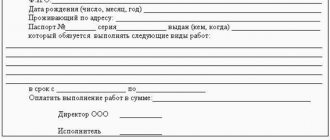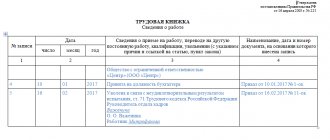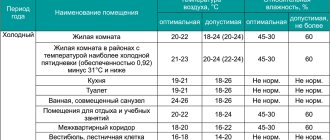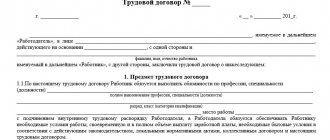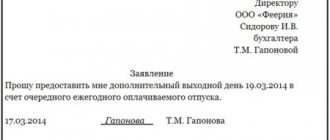What does this mean, definition
An employment contract for part-time work is a document confirming the conclusion of the relationship between the employer and the employee, which clearly states the conditions for this type of activity.
According to the definition of the Labor Code of the Russian Federation, part-time work is the performance by a person of work duties in his free time from activities at his main place of work. This is additional employment, officially registered.
Features of part-time work:
- it is considered regular and paid
- working time is strictly regulated by law: it should not take up more than half the duration of the main hourly working day (be no more than 4 hours a day for a standard working day and not exceed 1/2 of the standard hours for shift work)
- social guarantees and benefits (allowances, sick leave, bonus system) are provided in the same manner as other employees, but taking into account the number of hours worked
- Leave to employees is provided simultaneously with leave from their main job and does not depend on the general leave schedule in the organization.
- it is impossible to combine the main work activity with harmful working conditions with the same part-time job
There are two types of part-time work:
- external – when a person has a main job in another organization
- internal - combining several positions in one company, confirmed by the written consent of the employee and paid additionally
An employment contract with a part-time worker must be concluded in writing and drawn up in two copies, one of which is given to him in his hands, and the other remains for storage in the personnel department of the enterprise.
For some categories of persons there are restrictions or prohibitions on performing part-time work established by law (Article 282, Article 329, Article 276, Article 348.7 of the Labor Code of the Russian Federation, Resolution of the Ministry of Labor of the Russian Federation dated June 30, 2003 No. 41).
Hiring an external part-time employee, features of its registration
Any person has the right to get an additional job, carried out outside the walls of the organization in which he works during the main time (Part 1 of Article 282 of the Labor Code of the Russian Federation). An employee has the right to formalize contractual relations for external part-time work (hereinafter also referred to as ES) simultaneously with any number of employers (Part 2 of Article 282 of the Labor Code of the Russian Federation).
At the same time, it is important to remember that it is prohibited to employ citizens in the Armed Forces who (Part 5 of Article 282 of the Labor Code of the Russian Federation):
- have not reached the age of majority;
- work at the main enterprise in conditions that pose a danger or are recognized as harmful to the health or life of the employee, and part-time work is associated with the same risks;
- This right is limited by other legislative norms (for example, Part 5 of Article 4 of the Law “On the Prosecutor’s Office of the Russian Federation” dated January 17, 1992 No. 2202-1 limits the possibilities of part-time work for prosecutorial employees).
When hiring a part-time worker, the head of the organization is obliged to conclude an employment contract with him with a mandatory indication of the fact of the conflict (Part 4 of Article 282 of the Labor Code of the Russian Federation). One of the main conditions that must be included in the contract is an indication of the amount of payment for the work performed by the part-time worker, as well as allowances and bonuses (clause 4, part 2, article 57 of the Labor Code of the Russian Federation). In particular, this paragraph should reflect the amount of salary taking into account a coefficient of 0.5 of the full tariff rate, and in cases established by law, percentages of regional allowances and other payments (Part 3 of Article 285 of the Labor Code of the Russian Federation).
It is also worth noting that, at the initiative of an employee, the employer can write down in his work book information about the place of work performed on the aircraft (Part 5 of Article 66 of the Labor Code of the Russian Federation).
Sample form and completed example
There is no special form or established sample of an employment contract for part-time work. It is drawn up according to the standard form adopted within a particular organization.
There are a number of mandatory points and provisions that the document must contain:
- personal (full name) and passport details of the employee
- information about the company (name and official details)
- date of conclusion of the contract
- rights and responsibilities of an employee in accordance with his position
- information about the duration of a part-time worker’s working day at the enterprise (start time, end time, lunch break)
- place where the employee performs work duties
- section on liability of the parties
- work and rest schedule and regime
- terms of remuneration
- grounds and procedure for termination of the document
- other conditions if necessary
How to correctly specify special conditions
When concluding an employment contract for part-time work, in some cases it is necessary to specify special conditions regarding its nature and the duration of the employee’s duties.
Fixed-term contract
If it is necessary to register a part-time employee on a temporary basis, the validity period of the document must be precisely specified, after which such a contract becomes fixed-term. It is concluded in cases where there are legal grounds for this (provided for in Article 59 of the Labor Code of the Russian Federation) or by agreement of the parties, if this is permitted by law.
There are no additional differences for a part-time worker from concluding a standard fixed-term contract.
Indefinite
When drawing up an open-ended employment contract for part-time work, you need to fulfill only one condition: do not indicate the validity period of the document or note that it is concluded for an indefinite period.
For remote work
Drawing up an agreement with a remote part-time worker has its own nuances. Remote work (home-based or remote work) is an activity carried out outside the workplace created and controlled by the employer.
Labor relations between an employee and an employer are regulated by the general provisions of the Labor Code of the Russian Federation on remote work and are determined when concluding an agreement.
Registration of a part-time employee for remote work requires compliance with all standards for the length of the working day: the amount of work performed should be half that of a regular remote employee, since the working time is half the standard hours.
With flexible schedule
When concluding an employment contract for part-time activities with a flexible work schedule, the features of this type of work should be outlined in the “Conditions and nature of work” section, including options for monitoring and recording working time, as well as the procedure for paying for hours worked.
The remaining sections of the agreement do not differ from the standard document drawn up with a part-time partner.
Hourly rate
An employment contract with hourly wages is drawn up in situations where the employer is ready to pay the employee only for the time actually worked.
In such a document, in the section on wage conditions, it is necessary to reflect the hourly wage rate established for the employee, as well as prescribe the procedure for determining earnings for the billing period and the rules for calculating vacation pay, overtime payments, and pay on holidays and weekends.
In this case, it is necessary to comply with the regulated number of working hours assigned to the part-time worker.
Part-time employment contract
Part-time EMPLOYMENT AGREEMENT No.
g.
"" g.
in a person acting on the basis of, hereinafter referred to as "
Employer
", on the one hand, and a citizen, passport (series, number, issued), residing at the address, hereinafter referred to as "
Employee
", on the other hand, hereinafter referred to as "
Parties"
", have entered into this agreement, hereinafter referred to as the "Agreement", as follows:
SUBJECT OF THE AGREEMENT
1.1. This agreement governs the labor relations between the Employee and the Employer.
1.2. An employee is hired by a department for a position. Work address: .
1.3. This agreement is a part-time agreement.
1.4. Type of Agreement: for an indefinite period (unlimited);
1.5. Duration of the contract: start of work: "" year.
1.6. Test conditions: . During the probationary period, the employee is subject to the provisions of the Labor Code of the Russian Federation, other regulatory legal acts, and local regulations containing labor law standards.
1.7. The employee is assigned job responsibilities in accordance with the job description.
RIGHTS AND OBLIGATIONS OF AN EMPLOYEE
2.1. The employee undertakes:
- conscientiously fulfill his labor duties assigned to him by the employment contract and job description;
- comply with the internal labor regulations of the organization;
- observe labor discipline;
- comply with established labor standards;
- comply with labor protection and occupational safety requirements;
- comply with the rules and standards of business ethics existing in the Company;
- treat the property of the employer and other employees with care;
- immediately inform the employer or immediate supervisor about the occurrence of a situation that poses a threat to the life and health of people, the safety of the employer’s property;
- not to use in third-party organizations materials that are the intellectual property of the Employer (technologies, know-how, drawings, projects) produced by the employee while working for the Employer Company, or provided to him in the performance of his functional duties;
- not to engage in personal affairs and not to use computer and other technology and equipment, as well as e-mail resources for personal purposes; and also not to conduct long-distance and international negotiations of a personal nature;
- go on business trips to perform work duties under this Agreement outside the place of permanent work;
- immediately inform the Employer about any changes in your personal data, marital status, address, telephone number, level of education;
- at the request of the Employer and its representatives, provide the required information about the progress of current affairs related to the Employee’s jurisdiction;
- improve your professional qualifications;
- not to disclose, without the consent of the immediate supervisor, scientific, technical and other commercial and confidential information obtained during work in accordance with the Regulations on the non-disclosure of trade secrets;
- if the Employee is unable to fulfill his duties under this Agreement due to temporary disability, accident or other valid reason, he is obliged to notify his immediate supervisor and an employee of the Secretariat as soon as possible about the reason and possible duration of his absence. On the day of returning to work, the employee is obliged to provide the Employer with a medical certificate, a certificate of temporary incapacity for work or other supporting document explaining the reason for his absence for the entire period of absence;
2.2. The employee has the right to:
- conclusion, amendment and termination of an employment contract in the manner and under the conditions established by the Labor Code of the Russian Federation and other federal laws;
- providing him with work stipulated by the employment contract;
- a workplace that meets the conditions provided for by state standards of organization and labor safety and the collective agreement;
- timely and full payment of wages in accordance with their qualifications, complexity of work, quantity and quality of work performed;
- rest provided by the establishment of normal working hours, reduced working hours for certain professions and categories of employee, provision of weekly days off, non-working holidays, paid annual leave;
- complete reliable information about working conditions and labor protection requirements in the workplace;
- professional training, retraining and advanced training in the manner established by the Labor Code of the Russian Federation and other federal laws;
- association, including the right to create trade unions and join them to protect their labor rights, freedoms and legitimate interests;
- protection of your labor rights, freedoms and legitimate interests by all means not prohibited by law;
- compensation for harm caused to an employee in connection with the performance of his job duties, and compensation for moral damage in the manner established by the Labor Code of the Russian Federation and other federal laws;
- compulsory social and medical insurance in cases provided for by federal laws.
RIGHTS AND OBLIGATIONS OF AN EMPLOYER
3.1. The employer has the right:
- conclude, amend and terminate employment contracts in the manner and on the terms established by the Labor Code of the Russian Federation and other federal laws;
- reward the employee for conscientious, effective work;
- demand from the employee the performance of their job duties and careful attitude towards the property of the employer and other employees, compliance with the internal labor regulations of the organization;
- bring the employee to disciplinary and financial liability in the manner established by the Labor Code of the Russian Federation and other federal laws;
- adopt local regulations;
- at its discretion, provide assistance to the Employee in improving his qualifications and professional skills at the expense of the Employer;
- exercise control over the proper performance by the Employee of his job duties, as well as evaluate the results of the Employee’s activities (certification) in accordance with the regulatory documents of the Employer;
- if necessary, involve the Employee in overtime work, as well as work on weekends and holidays in compliance with the requirements of the legislation of the Russian Federation;
- with the consent of the Employee, entrust him with performing other labor duties that are not directly or indirectly related to the position he holds and are not provided for in the Agreement;
3.2. The employer undertakes:
- comply with laws and other regulatory legal acts, local regulations, terms of the collective agreement, agreements and employment contracts;
- provide the employee with work stipulated by the employment contract;
- ensure labor safety and conditions that meet occupational safety and health requirements;
- provide the employee with equipment, tools, technical documentation and other means necessary for the performance of their job duties;
- provide employees with equal pay for work of equal value;
- promptly comply with the instructions of state supervisory and control bodies, pay fines imposed for violations of laws and other regulatory legal acts containing labor law standards;
- provide for the employee’s everyday needs related to the performance of their job duties;
- carry out compulsory medical and social insurance of the employee in the manner established by federal laws;
- compensate for harm caused to an employee in connection with the performance of their labor duties, as well as compensate for moral damage in the manner and under the conditions established by the Labor Code of the Russian Federation, federal laws and other regulatory legal acts;
- not disclose information from the Employee’s personal file;
- perform other duties provided for by the Labor Code of the Russian Federation, federal laws and other regulatory legal acts containing labor law standards, collective agreements, agreements and employment contracts.
SALARY
4.1. The employee is given an official salary (tariff rate) in the amount of rubles per month. Remuneration is made in proportion to the time worked.
4.2. When performing work in conditions deviating from normal (when performing work of various qualifications, combining professions (positions), overtime work, working at night, weekends and non-working holidays and when performing work in other conditions deviating from normal), the employee is subject to appropriate payments provided for by labor legislation and other regulatory legal acts, agreements, and local regulations.
4.3. Payment of wages is carried out twice a month and on the dates of each month.
WORKING AND REST TIME
5.1. A part-time employee is assigned a part-time working day, a day-hour working week. Days off: Saturday and Sunday. Beginning of work: ; End of work: .
VACATION
6.1. The employee is granted annual basic leave of calendar days.
6.2. Annual main leave may be divided into parts, one of which should not be less than calendar days.
6.3. The order of provision of paid vacations is determined annually in accordance with the vacation schedule.
6.4. The right to use vacation for the first year of work arises for the Employee after six months of his continuous work under this Agreement.
6.5. An employee for whom an irregular working day is determined is granted additional paid leave in the number of working days.
6.6. An employee working part-time is granted annual paid leave simultaneously with leave for his main job. If an employee has not worked for six months at a part-time job, then leave is granted in advance. If in a part-time job the duration of the employee’s annual paid leave is less than the duration of leave at the main place of work, then the employer, at the request of the employee, provides him with leave without pay for the corresponding duration.
TERMINATION OF AN EMPLOYMENT CONTRACT (TERMINATION)
7.1. The grounds for termination of this employment contract (Article 77 of the Labor Code of the Russian Federation) are:
- agreement of the parties (Article 78 of the Labor Code of the Russian Federation);
- expiration of the employment contract (Article 79 of the Labor Code of the Russian Federation), except for cases where the employment relationship actually continues and neither party has demanded its termination;
- termination of an employment contract at the initiative of the employee (Article 80 of the Labor Code of the Russian Federation); The employee has the right to terminate the employment contract by notifying the employer in writing no later than two weeks in advance. The specified period begins the next day after the employer receives the employee’s resignation letter.
- termination of an employment contract at the initiative of the employer (Article 71 and Article 81 of the Labor Code of the Russian Federation);
- transfer of an employee, at his request or with his consent, to work for another employer or transfer to an elective job (position);
- the employee’s refusal to continue working in connection with a change in the owner of the organization’s property, a change in the jurisdiction (subordination) of the organization or its reorganization (Article 75 of the Labor Code of the Russian Federation);
- the employee’s refusal to continue working due to a change in the terms of the employment contract determined by the parties (part four of Article 74 of the Labor Code of the Russian Federation);
- the employee’s refusal to transfer to another job, required for him in accordance with a medical report issued in the manner established by federal laws and other regulatory legal acts of the Russian Federation, or the employer’s lack of relevant work (parts three and four of Article 73 of the Labor Code of the Russian Federation);
- the employee’s refusal to be transferred to work in another area together with the employer (part one of Article 72.1 of the Labor Code of the Russian Federation);
- circumstances beyond the control of the parties (Article 83 of the Labor Code of the Russian Federation);
- violation of the rules for concluding an employment contract established by the Labor Code of the Russian Federation or other federal law, if this violation excludes the possibility of continuing work (Article 84 of the Labor Code of the Russian Federation).
7.2. If the test result is unsatisfactory, the employer has the right to terminate the employment contract with the employee before the expiration of the test period, warning him about this in writing no later than one day before the expiration of the test period, indicating the reasons that served as the basis for recognizing this employee as having failed the test. The employee has the right to appeal the employer's decision in court. If the probation period has expired and the employee continues to work, then he is considered to have passed the test and subsequent termination of the employment contract is allowed only on a general basis. If during the probationary period the employee comes to the conclusion that the job offered to him is not suitable for him, then he has the right to terminate the employment contract at his own request by notifying the employer in writing no later than one day before the expiration of the probationary period.
7.3. In addition to the grounds provided for by the Labor Code of the Russian Federation and other federal laws, an employment contract concluded for an indefinite period with a person working part-time may be terminated if an employee is hired for whom this work will be the main one, of which the employer warns in writing the specified person no less than days before the termination of the employment contract.
7.4. An employment contract may also be terminated on other grounds provided for by the Labor Code of the Russian Federation and other federal laws.
OTHER CONDITIONS OF THE AGREEMENT
8.1. If a dispute arises between the parties, it must be resolved through direct negotiations between the Employee and the Employer.
8.2. If the dispute between the parties is not resolved, it shall be resolved in the manner prescribed by current legislation.
8.3. This agreement is drawn up in 2 copies having equal legal force. One copy is kept by the Employer, the other by the Employee.
LEGAL ADDRESSES AND PAYMENT DETAILS OF THE PARTIES
Employer
- Legal address:
- Mailing address:
- Phone fax:
- INN/KPP:
- Checking account:
- Bank:
- Correspondent account:
- BIC:
- Signature:
Worker
- Registration address:
- Mailing address:
- Phone fax:
- Passport series, number:
- Issued by:
- When issued:
- Signature:
Grounds and procedure for termination
An employment contract for part-time work is terminated on the same grounds (Chapter 13 of the Labor Code of the Russian Federation) and in the same manner as at the main place of work. But there is an additional reason here: the contract with a part-time worker is affected in connection with the hiring of a permanent employee for his position (Article 288 of the Labor Code of the Russian Federation).
Procedure for terminating the contract:
- the emergence of grounds for termination (application of resignation of one’s own free will, mutual decision of the interacting parties, liquidation of the enterprise or layoff, guilty actions of the employee, etc.)
- publication of the dismissal order
- registration of appropriate entries in the work book (requested at the main place of work)
- product of calculation
Part-time work is a legal and officially registered type of work. It is regulated within the framework of the legislation of the Russian Federation and has a number of nuances and features that must be taken into account when concluding an agreement with a part-time worker.
To clarify the information you are interested in on the issue of drawing up an employment contract for part-time work, contact a legal consultant using the form below or call the number listed on the website.
